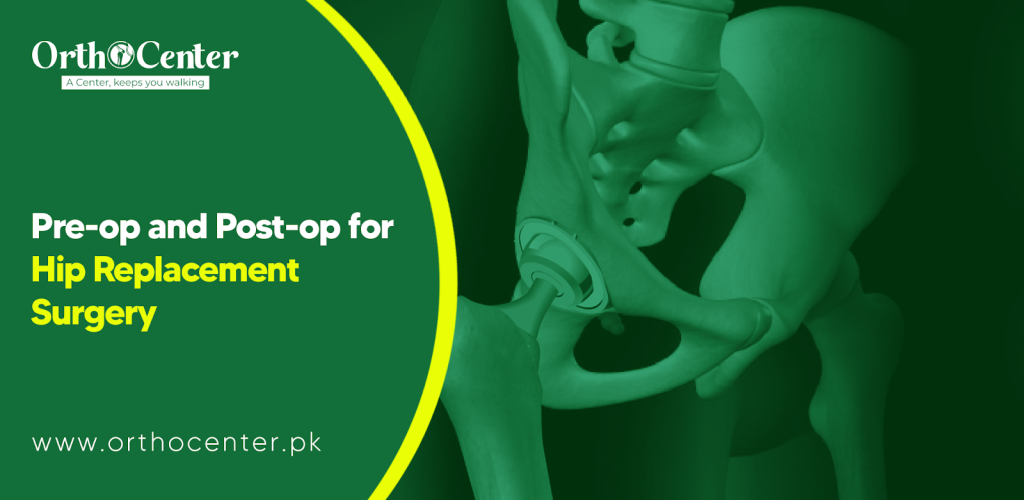Welcome to Our Orthopedic Clinic in Pakistan!

Hip pain is now a widespread issue that disrupts the quality of daily life and joint mobility, particularly affecting the aging population. One needs to be cautious about hip pain because it often begins with just a minor stiffness but can cause relentless pain if not treated early. Doing simple routine tasks becomes a chore with hip pain. Fortunately, in Pakistan, effective surgical options such as Hip replacement surgery are being used to fight this emerging problem. Nevertheless, gaining insight into the process of pre-op and post-op for hip replacement surgery is important for achieving optimum results.
At Orthocenter, Dr. Ahmed Shoaib uses his immense experience and international expertise to take the patients through each step prior to and after the surgery. He is frequently complimented by patients for his high surgical success rate and compassionate approach, and thus stands out as the leading orthopedic surgeon in Pakistan. This blog will walk you through the pre-op and post-op for hip replacement surgery to familiarize you with the information you require for an easy recovery.

Prior to your hip replacement surgery, take the time to weigh up the advantages of the operation with regard to your own situation. Before making the decision, have yourself both physically and mentally ready for the surgery. Put to your orthopedic doctor all the questions you might think about. These will generally involve what one should anticipate later on with regard to hip replacement surgery, how to handle discomfort, and which movements one should not do in particular.
One should avoid specifically. After you comprehend the challenge and the typical recovery time of the procedure, set realistic expectations, as it minimizes stress regarding the procedure and makes you a part of your healing process.
Post-op, following the hip replacement procedure, swelling and pain are normal and nothing to fret about. You can easily manage pain and swelling within a few days and weeks by resting between your exercises, applying ice to the incision site, and taking prescribed medications from your orthopedic surgeon. This is the tip that will do wonders. Place your leg high up, particularly when sleeping, since it will minimize your swelling. But if you always experience pain, then speak with your surgeon right away because this might be an indication of a complication.
Even the smallest error can lead to infections at your incision sites. As a result, wound care is a core element of post-operative care for hip replacement surgery. Not only are you protecting yourself from infections, but it will also help your body to heal. Hip Replacement Surgeons specifically cover the incision sites after operating with a sterile dressing. Patients have to take responsibility for it for up to 6 weeks, until they fully recover, to keep it clean and dry. One of the most-asked questions during the recovery period is, “Can I take a bath?” The reply is yes, but only after your surgeon has given you the go-ahead.
However, avoid swimming until you fully recover and refrain from wetting your incision site. Furthermore, it is crucial to monitor your wound for any signs of infection, such as redness, drainage, and warmth. Instantly contact your specialist in case you are developing a fever or if pain becomes severe. These could be the signs that need urgent attention.
The purpose of hip replacement surgery and appropriate rehabilitation is to enable you to return to your favourite activities without any pain or discomfort. But it should be done slowly and gradually. Recovery time after surgeries varies depending on their intensity. Recovery timelines also differ for different tasks. The main example is that you can resume desk work after hip replacement within a few days or weeks.
However, if your job involves physical work, you are bound to wait until you are fully healed. Surgeons recommend light impact sports post-op for hip replacement surgery when patients themselves feel comfortable. For complete recovery and regaining control over your joint health, listen to your surgeon.
Your commitment to regaining your joint function and mobility doesn’t end with initial recovery. Wellness should be a life-long commitment and not one process. Avoid crossing your legs or bending past 90 degrees to prevent dislocation of the hip. Physical exercises can never be left out if one wants the body to be flexible and strong.
As you continue through the postoperative healing process, slowly introduce yourself to low-impact sports such as cycling or walking for improved and more sustained joint fitness.
Last but not least, a normal weight is probably the best thing to obtain. Being overweight places stress on joints, and they tear under it. But with weight control, you can strengthen the durability of your hip joint with high quality artificial implants. Incorporating these habits into your daily routine will lead to an active and pain-free life ahead, and you will be able to experience it.
It is essential to know the pre-op and post-op procedures for hip replacement surgery in order to experience successful and long-term outcomes. It is only your orthopedic surgeon who can advise you on what you have to do prior to and after the surgery. So, select your surgeon carefully. Our orthopedic surgeon, Dr. Ahmed Shoaib, specializes in hip replacement surgery and provides quality diagnostic and treatment to patients. He particularly uses minimally invasive procedures, allowing him to deeply guide patients through preoperative and postoperative procedures for hip replacement surgery.
Dr. Ahmed Shoaib is recognized as the leading orthopedic specialist in Pakistan, providing individualized surgical plans and implant sizes tailored to each patient’s specific condition. We provide comprehensive treatment plans from evaluation, diagnosis, surgery, physiotherapy, and post-surgery medications. Consult with Dr. Ahmed Shoaib if you are considering hip replacement surgery. Discuss with him pre-op and post-op ways for hip replacement surgery. Trust us and take a step forward towards your healthier future.
WhatsApp Us